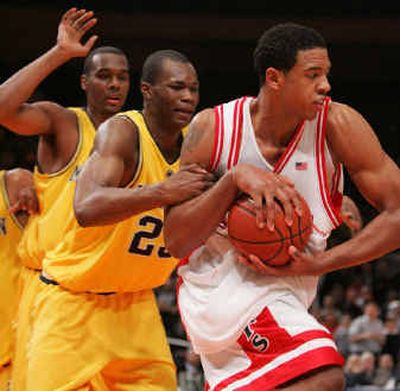Cooking with Frye

CHICAGO – It’s always easy to blame someone else, to fall back on extenuating circumstances as the reasons for failure. A blown call. A lack of depth. An arduous road trip. An inedible pregame meal. All those reasons and many more are trotted out to explain away losses.
So give props to Channing Frye, Arizona’s senior center. He will have none of that, not when discussing last season’s Wildcats. They were loaded with talent, as usual. They were expected to challenge for the Pac-10 title and make a deep run in the NCAA tournament.
But they flopped and flopped badly after climbing to No. 3 in the polls. They finished 11-7 in the Pac-10, their worst conference record in seven years, and then were bounced from the tournament in the first round by unheralded Seton Hall, which had finished an undistinguished sixth in the Big East.
The reason?
“The whole season, there were a lot of things we could have solved internally and didn’t,” Frye said. “We kind of overestimated ourselves. We always made excuses for why we were losing: ‘We don’t have enough people. Everyone’s tired. We practiced too long.’ We’d lose games and figure we’re still OK.
“It’s kind of hard to explain what it’s like feeling you have talent but lack chemistry. We had chemistry, but as soon as things went wrong, the chemistry would go away. Everyone tried to step up, but they wanted to step up in their own way.
“Everyone thinks you just go out and practice and play, but that’s just one little part. There’s many different sections to being a good team.”
The Wildcats were clearly not that last season. They were instead poster children for a dysfunctional family, a reminder that talent does not conquer all, a case study of the fine line that separates success and failure.
One of them, sophomore forward Andre Iguodala, was good enough to be selected ninth overall by Philadelphia in the NBA draft. But in a classic example of what ailed them, he also was the Wildcats player who was talking on his cell phone just moments before they took the floor for a Pac-10 tournament game.
“It was very difficult. One of the strengths of our teams has always been squad chemistry,” said coach Lute Olson.
Jason Gardner, Rick Anderson and Luke Walton were the Wildcats’ tri-captains in 2002 and 2003, but they were gone last season and no one stepped in to replace them.
“We really didn’t develop very strong leadership behind them because those guys were so good on and off the court,” Olson said. “We were lacking in a take-charge type leader.”
Frye agrees that the Walton-Gardner-Anderson triumvirate was missed.
“We knew our roles when they were around,” he said. “We knew this is what we do when the game comes down to the end: ‘This is who gets the ball, this is what’s going to happen.’ Last year we were trying to figure it out on our own. There were times when no one wanted to be a role player. Everyone wanted to be a chief. It was messed up.”
Arizona has more depth than last season and a blossoming freshman in 6-foot-4-inch guard Jawann McClellan. The Wildcats have a healthy Isaiah Fox, Frye’s backup who went down for good two games into last season, and a more settled Ivan Radenovic, who spent much of last season adjusting after joining the team in December.
But the biggest change is in their mind-set and the senior leadership they get from the perceptive Frye and mercurial guard Salim Stoudamire.
“I was very close-minded about what it took,” Frye said. But after last season’s disappointment, he started to ask questions and apply the answers he received.
Be yourself. Be consistent. Be upbeat and energetic and positive with people. Do extra work, especially on free throws. Attend to all the details.
There was one more.
“Do little things that make people come together,” Frye said.
Many of the Wildcats played together on a team while attending summer school.
They also started bowling together, having barbecues, and tailgating before home football games.
“Channing and Salim and (junior guard) Hassan Adams and the other guys were constantly doing things that bond people,” Olson said. “You can hardly go anywhere now without seeing all the guys together.”